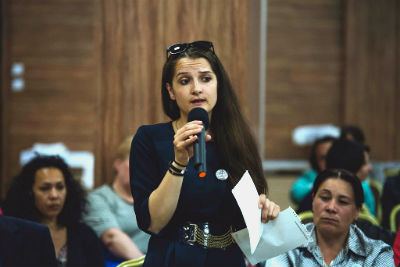Stepping it up towards Goal Five: More women in politics make for stronger democracies
Date:
The issue
One of Goal 5’s key targets is: Ensure women’s full and effective participation and equal opportunities for leadership at all levels of decision-making in political, economic and public life.
This target was set because women represent half of the world’s population but their representation in the political space is far from being equal to men. From the local to the global level, women are under-represented as voters as well as in elected offices, despite their proven abilities as leaders and their right to participate. Discriminatory laws, institutions and attitudes, and capacity gaps in education, networks and resources are holding women back.
Fast facts:
- Only 22.8 per cent of all national parliamentarians were women as of June 2016, a slow increase from 11.3 per cent in 1995 [1].
- As of September 2016, 10 women are serving as Head of State and 9 are serving as Head of Government [2].
- As of January 2015, only 17 per cent of government ministers were women, with the majority overseeing social sectors, such as education and the family [3].
Visit our Facts and Figures page for more
Evidence shows that women's leadership in political decision-making improves these processes. Women have demonstrated political leadership by working across party lines and championing issues of gender equality such as the elimination of gender-based violence, parental leave and childcare, pensions, gender-equality laws and electoral reform. Failing to allow women to participate in politics means failing to achieve a fairer and more equal society.
Snapshot of our work from around the world
Women gain political representation and leadership in rural China
“Chinese women are as capable to govern and lead as men, and must be given equal opportunities to do so,” says Liao Bin, from the Hunan province in China. She was elected as the head of her Village Committee at 27, after participating in the trainings on leadership and political participation for women under the “Enhancing Chinese Women’s Political Participation” programme.
Women’s political participation gains momentum in Moldova
Laura Bosnea, 28, made history in her community when she became one of the first two Roma women elected to the local council since the Republic of Moldova gained independence in 1991. She encountered resistance at first, as some party members felt that women had no place in politics. “Since I became councillor, 79 Roma children have been registered in schools. Now, the streets inhabited by Roma have lighting and garbage bins have been installed,” adds Bosnea.
Signaling a boost for gender equality, Liberia passes the ‘Affirmative Action Bill’
On 29 September, the Liberian House of Representatives concurred with the Senate to pass the Equal Representation and Participation Act of 2016, establishing seven ‘Special Constituencies’, among which five seats would be reserved for women, one for youth and one for the disabled.
From where I stand: Raja Shahwan
The biggest barrier to women’s participation in politics in Palestine is that women are not even aware of the rights that they have, and the false perception that women cannot take rational decisions, according to Raja Shahwan, from Gaza, Palestine. Shahwan insisted on completing her higher education and received training from UN Women to become a member of the local committee.
City 50-50 Platform encourages gender parity in Brazil
A digital platform "City 50-50: All for Equality", developed in partnership with UN Women, aims to encourage debate on equal rights between women and men in Brazil’s local elections this year. Candidates of the 5,568 Brazilian municipalities can register and make public commitments to promote women's rights during the election campaign. Voters, in turn, will be able to make the elected officials accountable. The project is one initiative among many others to increase awareness on the need to promote parity in political spheres.
Notes
[1] Single House or Lower House. Inter-Parliamentary Union. “Women in national parliaments, as of 1 June 2016”.
[2] UN Women calculation based on information provided to Permanent Missions to the United Nations.
[3] Inter-Parliamentary Union and UN Women. “Women in Politics: 2015"





